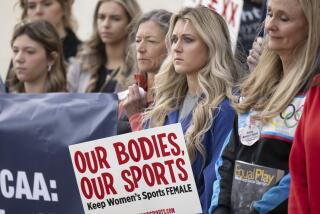Caster Semenya hints at retirement but is scheduled to race in Doha

A day after losing a historic court decision, Caster Semenya hinted at early retirement on social media but was also entered to compete at a professional track meet in Qatar.
The South African runner failed in her appeal of a controversial rule that will require her and other female athletes with naturally high testosterone to take hormone-suppressing medication if they wish to continue racing.
“Knowing when to walk away is wisdom. Being able to is courage,” the 28-year-old posted Thursday on Twitter. “Walking away with your head held high is dignity.”
Despite this cryptic message, Semenya’s name appears on the entry list for the 800 meters at the Doha Diamond League meet on Friday. That race would mark the last time she can compete before the International Assn. of Athletics Federation’s new rule takes effect.
The rule has nothing to do with cheating or performance-enhancing drugs; instead, it was devised for women with natural “difference of sexual development,” or DSD, meaning they have a testosterone level that exceeds the normal range for females.
IAAF officials claim this condition, which they estimate occurs in seven of every 1,000 runners at the elite level, represents an unfair advantage because increased testosterone can equate to greater strength and speed.
“Athletics has two classifications — it has age, it has gender,” IAAF President Sebastian Coe said at news conference on Thursday. “We are fiercely protective about both and I’m really grateful that the court of arbitration has upheld that principle.”
The federation has insisted its rule, covering events from 400 meters to the mile, will be administered with “care and compassion.” Any athlete with DSD would need to begin treatment quickly to attain the mandated hormone level and be deemed eligible for the world championships this fall.
Sign up for our daily sports newsletter »
Though Semenya is a double Olympic champion at 800 meters, there has been speculation about her shifting to 1,500 meters because the Court of Arbitration for Sport — in its somewhat nuanced decision — expressed concerns about whether testosterone limits should apply at that distance.
At his news conference, Coe confirmed the rule would apply to all specified events. Also on Thursday, four-time Olympic champion Michael Johnson voiced support for the regulation.
“The IAAF has to make a decision on the line that’s drawn between the female races and the men’s races,” Johnson told Reuters. “I think the decision was based on the fairness of sports, so that there is a level playing field for all of the athletes in any given race.”
The Court of Arbitration for Sport is headquartered in Switzerland, so Semenya would have to pursue any further appeal in that nation’s tribunal court. She now has less than 30 days to file and experts say such challenges can be extremely difficult.
Meanwhile, the field for her race in Doha includes former European champion Lynsey Sharp and Olympic silver medalist Francine Niyonsaba, who has revealed that she also has DSD.
Follow @LAtimesWharton on Twitter
More to Read
Get our high school sports newsletter
Prep Rally is devoted to the SoCal high school sports experience, bringing you scores, stories and a behind-the-scenes look at what makes prep sports so popular.
You may occasionally receive promotional content from the Los Angeles Times.







